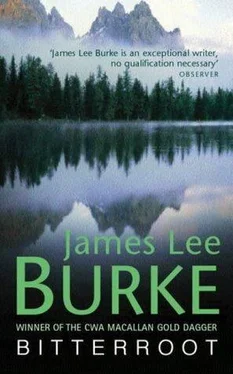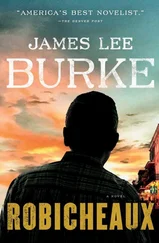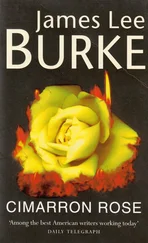"I don't think the Voss family feels lucky, sir," I said.
"No offense meant. Some people around here would have shot him and drug his body through the door. Who do you think he was?"
"Y'all got a file on a kid from North Carolina by the name of Terry Witherspoon?"
Wednesday morning Doc answered the cordless phone in the kitchen, then handed it to me and walked out of the room.
"I'm trying to figure out what your idea of a relationship is. I'm sure the problem is mine," Cleo's voice said.
"I'm sorry?"
"Just for a minute, can't you lose that obtuse attitude?"
"I haven't called you? That's what we're talking about?"
"What do you think?" she asked.
"I figured I'd struck out."
"Maybe you decided you'd just find another chickie and cut a new notch on your gun."
"I don't think that's a real good thing to say, Cleo."
"Then maybe we need to have a serious talk."
"What do you call this?" I said.
"Come to the house."
"I have an appointment at the sheriff's office."
"Screw your appointment," she said.
"I'm going to hang up now. Good-bye, Cleo."
I eased the receiver down in the cradle, my skin tingling, as though I had just walked through a cobweb.
Doc WAs BOARDING an Appaloosa and a thoroughbred for a neighbor. I went outside and propped my forearms across the top rail of the rick fence that enclosed the horse lot and began to shave an apple with my pocketknife. The barn was made of ancient logs that were soft with decay. Through the open back doors I saw both horses walk out of the pasture, through the cool darkness of the barn, their hooves powdering dust in the air, sawing their heads as they approached the fence.
I quartered the apple and fed pieces to each of them with the flat of my hand. Inside the barn, his pinstripe suit and ash-gray Stetson slatted with sunlight, I saw L.Q. Navarro perched atop a stall, idly spinning the rowel on a Mexican spur.
"You're getting sucked in, bud," he said.
"With Cleo?"
"I'm talking about these skinheads and bikers. Doc was trying to shut down that gold mine. Now he's charged with murder and you're rolling in the dirt with a collection of tattooed pissants whose mothers was probably knocked up by a spittoon."
"I didn't have much selection about it, L.Q."
"That's what we told each other when we was blowing feathers off them Mexican drug mules."
"Anything else you want to tell me?"
He flicked the rowel on the spur and lifted his eyes.
"I'd sure like a couple of ice-cold Carta Blancas," he said.
I WENT BACK up on the front porch, where Doc was trying to tie a blood knot in a tapered leader. But it was obvious he could not concentrate on the task at hand. He squinted at the tippets, missed threading a nylon tip through a loop, then gave it up and dropped the leader on top of a cloth creel by his foot.
"Can you show me all the information you have on that mining company?" I said.
"What for?"
"They have a vested interest in seeing you jammed up."
"I remodeled Lamar Ellison's face in that bar. I got my daughter raped. I thought I was through with free-fire zones. Instead, I carried one back from Vietnam."
"Don't put this on yourself, Doc."
"That stuff you want is out in the barn. You can burn it when you're finished," he said.
I spent the next two hours rooting through the cardboard boxes that Doc had stuffed with news clippings and documents on extractive industries in Montana. File folders filled with aerial photographs showed miles of clear-cuts and once-virgin wilderness areas that had been turned into stump farms or chemical soup. Networks of creeks that fed the upper Blackfoot River looked like gangrene in living tissue. The cumulative damage wasn't just bad. It numbed the mind.
The corporation name that recurred again and again was Phillips-Carruthers, old-time union busters whose goons had once loaded Wobblies onto cattle cars and transported them in 115-degree heat into the Arizona-New Mexico desert and left then locked inside without water for two days. Those who didn't die or end up in Yuma Territorial Prison as syndicalists thought twice about trying to shut down a Phillips-Carruthers mine again.
How far would a bunch like this be willing to go in order to get Doc off the board?
I heard the tinkling sound of roweled spurs on the plank floor of the barn and looked up and saw L.Q. Navarro peering over my shoulder.
"There's a story in there about Woody Guthrie and his buds going up against that company in 1947," he said.
"These are the guys we love to hate. It's too easy, L.Q.," I said.
"John D.'s hired thugs killed my grandmother at the Ludlow Massacre in 1914. Wasn't no mystery to it," he said.
"The bad guys are a lot slicker today," I said.
"They ain't no slicker, son. The good guys are just dumber."
I started to smile at his joke, but then looked at his face. He was staring out the back of the barn at the thoroughbred and Appaloosa in the pasture, an unrelieved glint of sadness in his eyes. The horses were grazing next to a ribbon-like stream that wound through Indian paintbrush and harebells, tearing at the grass, their tails switching across their rumps.
"What are you studying on?" I asked.
He shook the moment out of his face.
"Remember when we chased that bunch of coke mules across the sand flats? We painted red flowers all over those stovepipe cactus. We took a rum flask out of a dead man's pocket and had a drink and poured the rest on his face. You miss it sometimes?" he said.
"No," I replied.
L.Q. pulled his Stetson down over his brow and turned away from me to hide the gentle reproach in his eyes. When I looked at him again he had gone.
I don't miss it. I know I don't, I said to myself as I walked back toward the house, like the alcoholic on his way to the saloon, denying the nature of his own insatiable desires.
"Talking to yourself?" a voice said from the porch.
"Oh, hi, Maisey, I didn't see you there," I said.
"No kidding?" she said. She wore makeup and khakis and sandals and a low-cut embroidered white peasant blouse and looked older than her years. She picked up an oversize can of beer that was wrapped in a paper bag. She salted the top and drank from it.
"Where's your old man?" I asked.
"In town."
"Early in the morning for a cold one, isn't it?"
"Billy Bob?"
"Yes?"
"Mind your own business. By the way, Lucas said to tell you he was going down to the Milltown Bar with Sue Lynn Big Medicine to see about a job in the band. You want a beer?"
The Milltown Bar was a legendary clapboard blue-collar anachronism squeezed between river shacks and railroad tracks and a sawmill at the southern tip of the Blackfoot Valley.
Lucas had no trouble getting a four-night-a-week slot in the house band. Besides guitar, he could sing and play banjo, mandolin, fiddle, Dobro, and stand-up bass. Also, he didn't bother to ask the bar owner how much he would be paid.
It should have been a fine morning for Lucas. It wasn't. This was the first time he'd seen Sue Lynn Big Medicine since the fight at the dance up in the Jocko. But she didn't act the same anymore. She seemed disconnected, her gaze lingering on his only momentarily, like somehow the fact she was two years older had suddenly become important.
Outside the bar, while he fitted his guitar case into the backseat of her car, he said, "Something wrong, Sue Lynn?"
"Not in a way you can do anything about," she replied.
"I see. There's a problem, but I'm too young or dumb to understand it?"
"Your father doesn't want me around you. He's probably right."
Читать дальше












